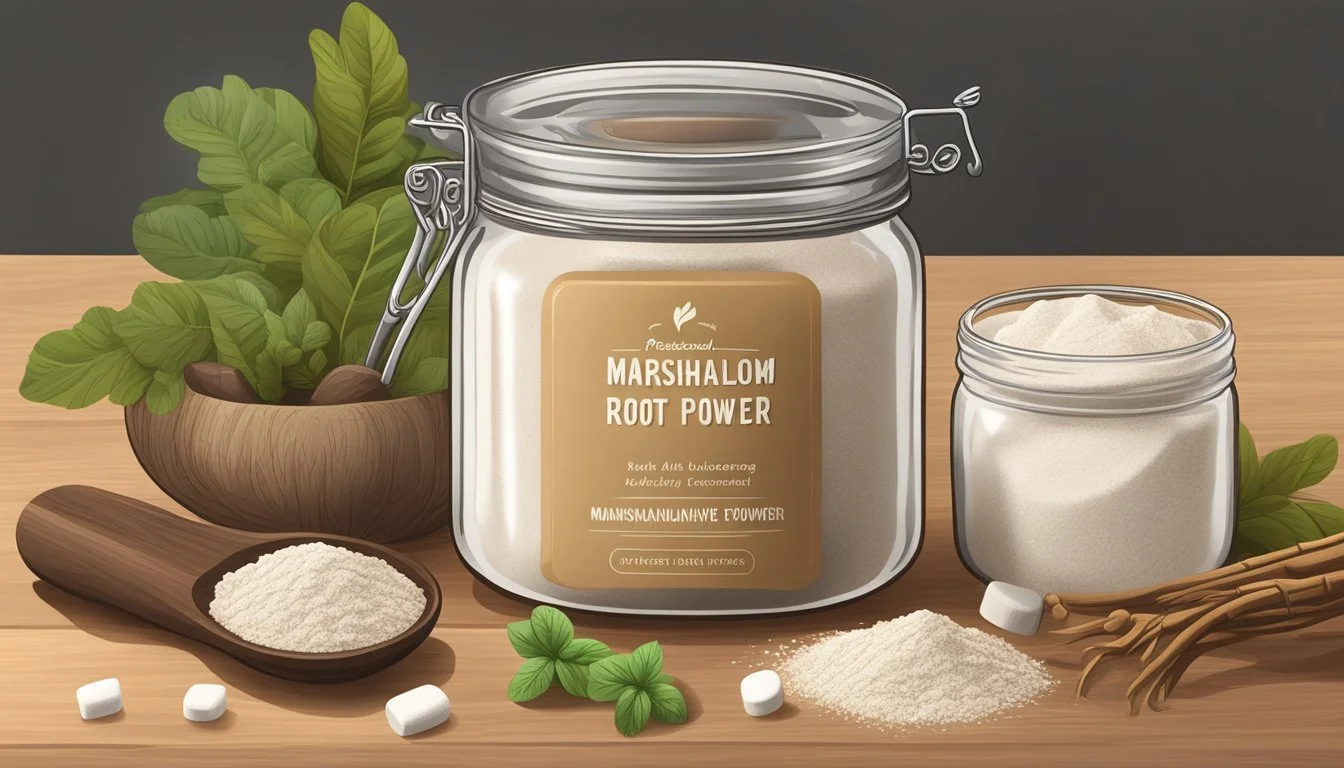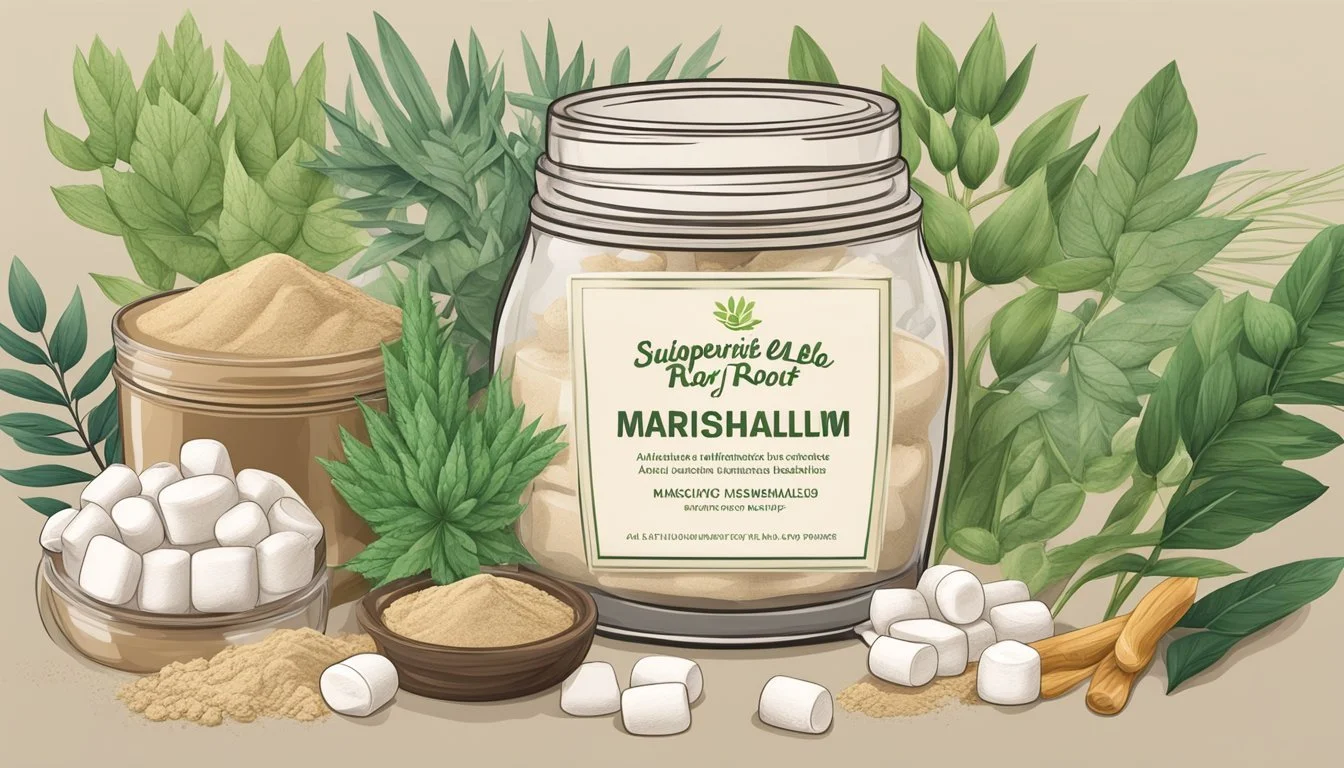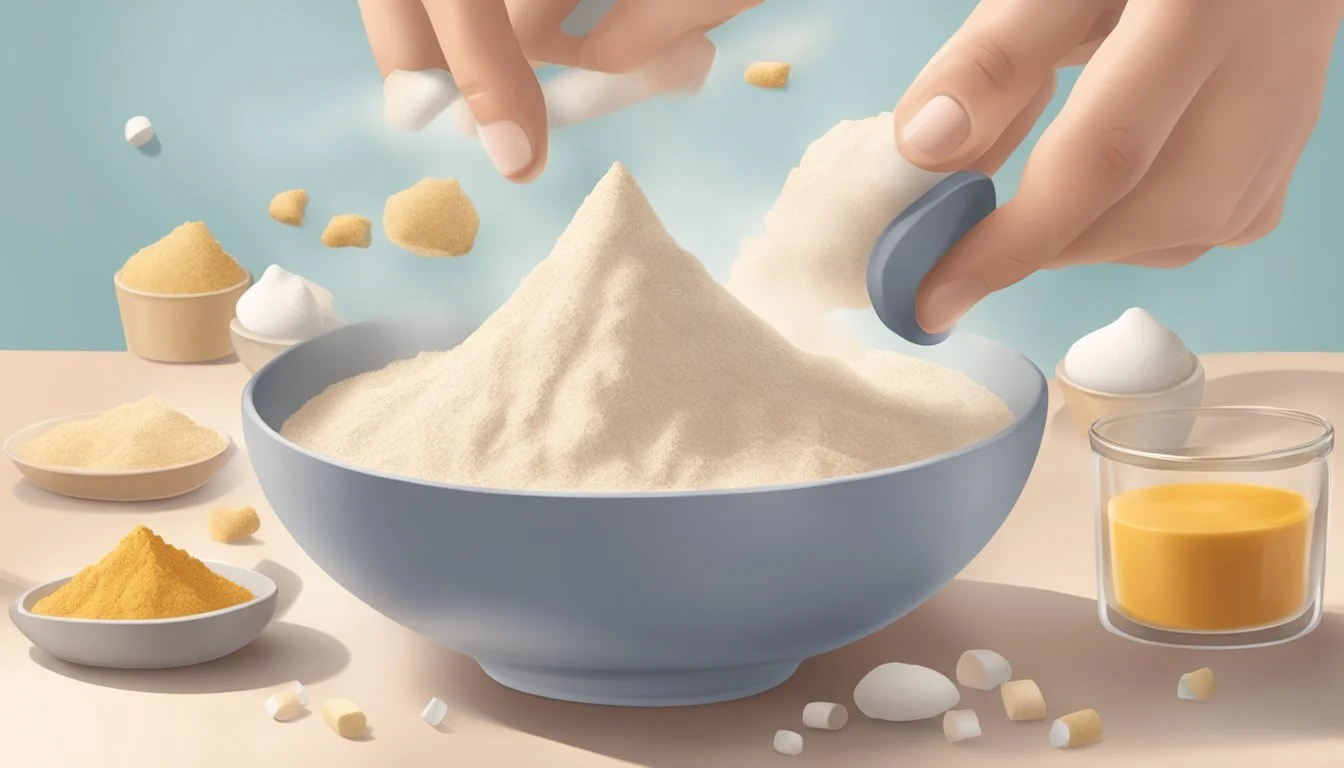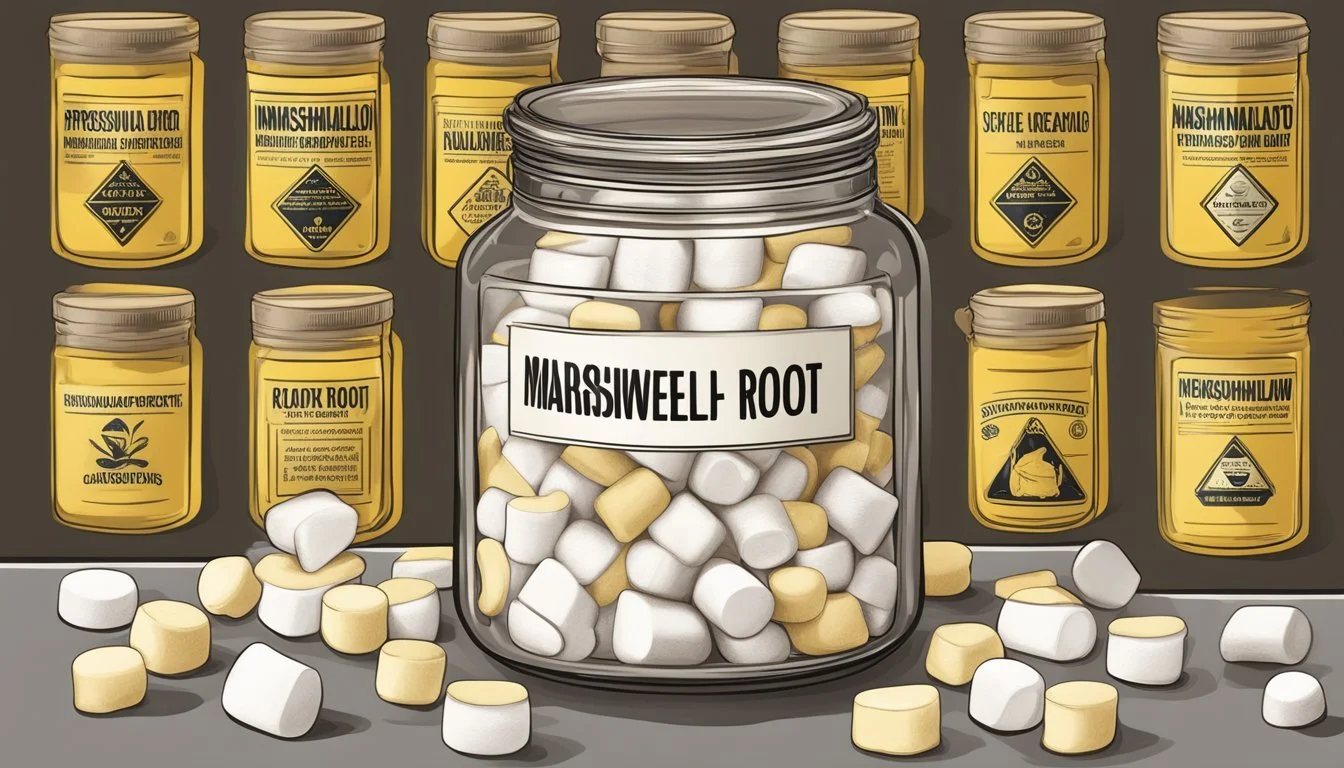Marshmallow Root Powder Substitutes
Effective Alternatives for Healing
Marshmallow root powder, derived from the native European plant Althaea Officinalis, has long been praised for its soothing mucilage content, making it a popular herbal remedy. When marshmallow root powder is unavailable, several substitutes can effectively step in, ensuring that your recipes and remedies remain beneficial and effective. These substitutes not only add the desired texture and consistency but also offer various health benefits.
Some of the best alternatives to marshmallow root powder include gum tragacanth, xanthan gum, guar gum, and marshmallow leaf. Each of these has its own unique properties while still providing the mucilage necessary for soothing applications. Sandalwood powder and cedarwood are also commonly used bases and binders, particularly in incense-making.
When experimenting with these substitutes, it's important to consider the specific needs of your recipe or remedy. For culinary uses, guar gum or xanthan gum blend seamlessly into recipes, while herbal remedies might benefit from the unique properties of marshmallow leaf. Ultimately, the ideal substitute is one that meets your specific requirements while maintaining the integrity of the final product.
Understanding Marshmallow Root Powder
Marshmallow root powder, derived from the plant Althaea officinalis, is valued for its numerous medicinal properties. It possesses key compounds like mucilage and flavonoids, which contribute to its therapeutic effects.
Origins and Composition
Althaea officinalis, commonly known as marshmallow, is a perennial herb native to Europe, Western Asia, and Northern Africa. The root is the primary part used for medicinal purposes. It is rich in mucilage, a gelatinous substance that provides soothing properties, as well as essential oils, antioxidants, and flavonoids, which contribute to its healing effects.
Health Benefits
Marshmallow root powder is primarily known for its ability to soothe the respiratory and digestive tracts. It can help alleviate cough, sore throat, and dry mouth by creating a protective barrier. Additionally, it supports gut health by soothing ulcers and inflammation in the stomach lining. The anti-inflammatory properties make it beneficial for treating minor burns, wounds, and insect bites.
Usage in Traditional Medicine
In traditional medicine, marshmallow root has been used in various forms including teas, tinctures, salves, and poultices. Herbalists have relied on it to treat a range of conditions such as respiratory ailments, digestive issues, and skin irritations. It is often included in topical preparations due to its ability to heal and soften skin.
How to Store Properly
To maintain the potency of marshmallow root powder, it should be stored in an airtight container. Keep it in a cool, dark place away from moisture and direct sunlight. Proper storage helps preserve the essential oils and active compounds, ensuring the effectiveness of the herb over time.
Popular Substitutes for Marshmallow Root Powder
When searching for alternatives to marshmallow root powder, several substitutes offer similar benefits such as anti-inflammatory properties and soothing effects on mucosa. They may come in forms like capsules, powders, or traditional preparations like teas.
Using Slippery Elm
Slippery elm is a widely recognized substitute for marshmallow root powder. It is derived from the inner bark of the Ulmus rubra tree.
Slippery elm forms a gel-like substance when mixed with water, which is effective for soothing gastric and mucosal irritation. It can be consumed as a tea, in powder form, or in capsules.
People often use slippery elm to relieve coughs and throat irritation due to its mucilage content. This mucilage creates a protective layer over mucous membranes, providing relief and comfort.
The Benefits of Licorice Root
Licorice root is another alternative, known for its anti-inflammatory and soothing properties. It has been used traditionally to treat ailments of the throat and digestive system.
Its compounds, such as glycyrrhizin, help reduce inflammation and support the health of gastric mucosa. Licorice root can be found in powder form, teas, or capsules.
Licorice root is also beneficial for easing coughs and other respiratory issues, making it a versatile substitute. However, those with high blood pressure should use it cautiously due to its potential effects on blood pressure.
Gelatin and Its Similarities
Gelatin, derived from animal collagen, is an effective substitute when a gel-like texture is needed. It is commonly used in both culinary applications and as a health supplement.
Gelatin can mimic the gelling properties of marshmallow root powder, making it useful in recipes that require thickening or stabilizing. It is available in powder form and can be mixed with liquids to create nutritious gels.
Additionally, gelatin has benefits for joint health and skin elasticity due to its high protein content. This makes it a multifunctional ingredient in both food and health products.
Home Ingredients as Alternatives
Certain home ingredients can also serve as substitutes. For instance, a mixture of honey and oats can provide soothing effects similar to marshmallow root powder.
Honey is well-known for its anti-inflammatory and antimicrobial properties. Combined with oats, which have soothing and protective qualities, this mixture can help with throat and gastric discomforts.
These ingredients can be consumed as a simple remedy or incorporated into recipes to provide relief and nourishment. Using accessible home ingredients offers a practical solution for those seeking natural substitutes.
Considerations When Choosing Substitutes
When selecting substitutes for marshmallow root powder, it is essential to evaluate the health implications and effectiveness for specific conditions. This helps ensure safety and suitability for your needs.
Health Considerations
Marshmallow root powder substitutes should be chosen with attention to potential allergies and side effects. Some individuals might be allergic to herbal substitutes, which can cause reactions such as rashes or difficulty breathing. For instance, those prone to eczema or sensitive skin should proceed with caution.
Pregnant and breastfeeding women should consult healthcare professionals before using substitutes, as certain herbs may affect fetal development or milk production. It is also crucial to consider potential interactions with medications. For example, herbs like licorice root can interact with blood pressure medications.
Monitoring for signs of sickness or adverse effects, such as nausea or headaches, is vital when trying new substitutes. Always start with a small dose to assess tolerance and safety before incorporating the substitute regularly.
Efficacy for Specific Conditions
Substitutes for marshmallow root powder need to be evaluated based on their effectiveness in treating specific conditions. If seeking relief from sore throats and colds, look for substitutes known for their mucilaginous properties, such as slippery elm or licorice root.
For wound healing and skin conditions like eczema, herbs with anti-inflammatory and soothing properties, such as calendula or aloe vera, might be effective. These substitutes can promote faster healing and reduce irritation.
When addressing pain and inflammation, willow bark could be considered due to its natural salicylic acid content, akin to aspirin. Furthermore, echinacea might offer broader immune support for those prone to frequent illnesses.
It's important to match the substitute to the specific therapeutic need to get the best results. Experimentation and consultation with a healthcare provider can help determine the most appropriate and effective substitute.
How to Use Substitutes
When substituting marshmallow root powder, consider methods such as creating herbal teas, making topical preparations, and incorporating it into cooking and baking. Adaptations should maintain the beneficial properties while offering versatility in use.
Creating Herbal Teas
Marshmallow root powder substitutes can be effectively used to make soothing herbal teas. Chamomile, hops, and lemon balm are great alternatives.
To brew, mix one teaspoon of the chosen dried herb with boiling water.
Let it steep for 10 minutes. Strain and enjoy as a calming tea. This method is popular among herbalists for its gentle effects on the digestive and respiratory systems.
Pro tip: Enhance the blend with honey for added sweetness.
Making Topical Preparations
Substitutes for marshmallow root powder like aloe vera, calendula, and comfrey are ideal for topical uses. These alternatives work well in creams and gels for insect bites, skin irritation, and wound healing.
To create a topical cream, mix one part of the powdered substitute with four parts of a neutral base such as coconut oil.
Apply to the affected area twice daily. The mucilaginous properties help soothe and protect the skin.
Cooking and Baking Applications
For cooking and baking, marshmallow root powder can be replaced with ingredients like gelatin, agar-agar, or a mix of honey and peanut butter. These substitutes work well in recipes needing thickening or gelling.
To use gelatin, dissolve one teaspoon in warm water before adding it to the dish.
Agar-agar can be used similarly but is a vegan option. For a sweeter touch, blend equal parts honey and peanut butter and incorporate into desserts as a binding agent. This mixture is ideal for treats like Rice Krispies.
Potential Side Effects and Precautions
Marshmallow root powder is commonly used for its numerous health benefits, but it is essential to understand possible side effects and safe use practices.
Understanding Adverse Reactions
Some individuals may experience allergic reactions when using marshmallow root powder. Symptoms can include skin rashes, itching, or difficulty breathing. If any of these occur, it is crucial to discontinue use immediately and seek medical advice.
Dry mouth is another potential side effect. Marshmallow root can affect saliva production, leading to an uncomfortable, dry sensation in the mouth. Some users might experience gastrointestinal issues like stomach upset or diarrhea when first starting the supplement.
Individuals on certain medications should exercise caution. Marshmallow root may interfere with the absorption of oral drugs due to its mucilage content, potentially diminishing medication effectiveness. Consulting a healthcare provider before combining marshmallow root with other treatments is strongly advised.
Safe Use Practices
Proper dosing is key to minimizing risks. Start with the lowest effective dose and gradually increase as needed to assess tolerance. Marshmallow root is available in various forms such as capsules, teas, or extracts. It is advisable to follow the manufacturer’s recommendations or those provided by a qualified herbalist.
Pregnant or breastfeeding women should consult a healthcare professional before using marshmallow root powder. The safety of this supplement during pregnancy and breastfeeding has not been thoroughly studied, so professional guidance is essential.
Maintaining hygiene standards when preparing marshmallow root powder can prevent bacterial contamination. Always store the powder in a cool, dry place and use clean utensils for preparation. Consistency in practice will help ensure safety and efficacy.
Adhering to these precautions aids in maximizing the benefits of marshmallow root while minimizing potential risks.
Enhancing Overall Health With Marshmallow Root and Its Alternatives
Marshmallow root is known for its benefits as a herbal remedy. It supports the gut lining, offering relief from heartburn and other digestive issues.
This root has anti-inflammatory and antibacterial properties, helping soothe inflamed mucosa in the respiratory and digestive systems. Its diuretic nature assists in reducing water retention and edema.
Alternatives to Marshmallow Root
Slippery Elm:
Contains tannins to soothe the throat and skin.
Aids in the protection of the gut lining.
Licorice Root:
Known for anti-inflammatory and overall health benefits.
Eases respiratory issues and heartburn.
Provides anti-inflammatory and antibacterial effects.
Helps in soothing inflamed mucosa and reducing digestive discomfort.
Mullein:
Supports respiratory health, acting similar to marshmallow root.
Calms coughs and reduces inflammation.
Quick Comparison
Alternative Key Benefits Slippery Elm Soothes throat, protects gut lining Licorice Root Anti-inflammatory, eases heartburn Aloe Vera Anti-inflammatory, antibacterial Mullein Respiratory support, reduces inflammation
Each of these alternatives provides similar benefits to marshmallow root and can complement an overall health regimen effectively.






